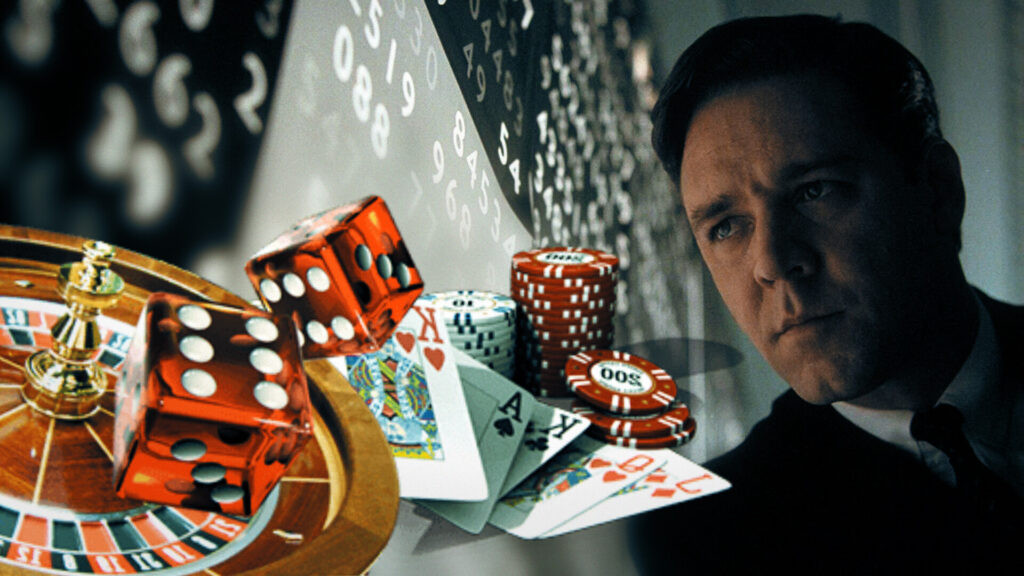
Casino Online – Gambling is a highly popular and controversial activity that has a significant psychological impact on individuals. Research has shown that gambling can elicit a range of emotions, including excitement, anticipation, and joy, as well as anxiety, frustration, and disappointment. These emotional highs and lows create a unique rollercoaster experience for gamblers, which can have both positive and negative effects on their mental well-being.
One of the key psychological impacts of gambling is the potential for addiction. The thrill and adrenaline rush that comes from winning can trigger a release of dopamine in the brain, reinforcing the behavior and leading to a compulsive need to continue gambling. This addiction can have devastating consequences, causing financial problems, strained relationships, and a decline in overall mental health.
The constant pursuit of the next big win can consume a person’s thoughts and energy, leading to a vicious cycle of gambling and emotional turmoil. It is important for individuals to understand the psychological impact of gambling and take steps to mitigate its potential negative effects.
Understanding the Emotional Rollercoaster of Gambling
Gambling is a unique activity that can generate a wide range of emotions. From the exhilaration of winning to the frustration of losing, gamblers often find themselves on an emotional rollercoaster. This rollercoaster is fueled by anticipation, hope, excitement, and disappointment, which can all quickly shift within the span of a single bet.
Whether it’s the tension in the air as the dice roll, the rush of adrenaline coursing through their veins as the cards are dealt, or the sinking feeling of defeat when luck is not on their side, the emotional landscape for gamblers is constantly shifting and evolving.
One key emotion that is often experienced during the rollercoaster of gambling is anxiety. As players place their bets and wait for the outcome, the uncertainty of the outcome can trigger feelings of unease and nervousness. The fear of losing money, the pressure to make the right decision, and the anticipation of the unknown can all contribute to heightened levels of anxiety.
This can manifest in physical symptoms such as racing heartbeats, sweating, and shaky hands. In some cases, this anxiety can become overwhelming and can interfere with a person’s ability to think clearly and make rational decisions, leading to impulsive behavior and potential financial losses.
Building Inner Strength in the Face of Gambling Challenges
Building inner strength is crucial when faced with the challenges of gambling. It requires a deep understanding of one’s emotions and the ability to handle the highs and lows that come with this pursuit. To build inner strength, individuals must first acknowledge and accept their emotions, whether it be excitement, fear, or disappointment.
This emotional awareness enables gamblers to navigate through the ups and downs and develop resilience as they face the uncertainties that gambling often brings. Additionally, practicing self-discipline is key. Setting limits and sticking to them helps individuals maintain a sense of control and fosters the development of inner strength.
Another important aspect of building inner strength in the face of gambling challenges is developing a positive mindset. Maintaining a positive outlook helps gamblers approach each situation with optimism and resilience. By reframing setbacks as learning opportunities, individuals are able to turn difficulties into motivation for personal growth.
It is also crucial to cultivate self-belief and confidence in one’s abilities. Believing in oneself enables gamblers to overcome obstacles and persist in their pursuit of long-term success. By focusing on building inner strength, individuals can navigate the challenges of gambling with resilience and ultimately enhance their overall well-being.
Recognizing and Coping with Losses in the Gambling World
Recognizing and coping with losses is an essential aspect of navigating the gambling world. Whether you are a seasoned gambler or just starting out, losses are an inevitable part of the game. It is crucial to develop the ability to recognize when losses occur and to cope with the accompanying emotions that arise.
When it comes to recognizing losses, it is important to remember that they are not a sign of failure or personal inadequacy. In gambling, losses can occur due to various factors such as luck, probability, or even poor decision-making. By acknowledging that losses are a natural part of the gambling experience, you can avoid falling into a cycle of self-blame or despair. Instead, adopt a mindset that focuses on learning from losses and using them as opportunities for growth and improvement. By doing so, you can develop resilience and the ability to bounce back from setbacks in the gambling world.
Developing a Healthy Mindset for Long-term Gambling Success
One of the fundamental elements for achieving long-term gambling success is developing a healthy mindset. This entails cultivating a positive and resilient attitude towards both winning and losing. A healthy mindset in gambling involves embracing the reality that losses are an inevitable part of the game, while also maintaining a sense of optimism and confidence in one’s ability to recover and achieve success.
It requires understanding that luck and chance play a significant role in gambling outcomes, and that focusing solely on winning can lead to frustration and disappointment. Rather than fixating on short-term results, developing a healthy mindset involves adopting a long-term perspective, acknowledging that success in gambling is a journey that requires patience, perseverance, and a commitment to continuous self-improvement.
To develop a healthy mindset for long-term gambling success, it is crucial to cultivate self-awareness and emotional intelligence. This involves being mindful of one’s emotions and reactions during the gambling experience. Recognizing and managing emotions such as frustration, anger, and anxiety can help prevent impulsive decision-making and enable more rational choices.
Additionally, developing an understanding of one’s strengths and limitations in gambling can help create realistic expectations and avoid excessive risk-taking. By developing a healthy mindset, gamblers can navigate the unpredictable nature of gambling with greater resilience and enhance their chances of long-term success.
Strategies for Managing Stress and Anxiety in Gambling
When it comes to managing stress and anxiety in gambling, there are several strategies that can be helpful. One effective strategy is to set limits on your gambling activities. By establishing both time and money limits, you can create a structure that helps prevent excessive stress and anxiety. Knowing that you have a predetermined period of time or a specific budget can provide a sense of control and reduce the uncertainty that often accompanies gambling.
Another strategy is to take breaks and engage in self-care activities. Gambling can be an intense and immersive experience, and it is important to give yourself regular breaks to relax and recharge. Engaging in activities that you enjoy, such as exercise, spending time with loved ones, or pursuing hobbies, can help alleviate stress and anxiety. Taking breaks also allows for perspective, giving you the opportunity to evaluate your gambling patterns and make adjustments if necessary.
Resilience Techniques for Bouncing Back from Setbacks in Gambling
Resilience is a key trait that can help individuals bounce back from setbacks in the gambling world. When faced with losses or unfavorable outcomes, it can be easy to become discouraged and disheartened. However, by incorporating certain resilience techniques, individuals can develop the inner strength to overcome these challenges and maintain their focus on long-term success.
One important technique is reframing negative experiences as learning opportunities. Instead of dwelling on past losses, individuals can choose to view them as valuable experiences that provide insight into their gambling strategies and decision-making processes. By shifting their mindset in this way, they can extract lessons from setbacks and use them to adapt and improve their future approach.
Additionally, practicing self-compassion is crucial in fostering resilience. Rather than being self-critical and blaming themselves for losses, individuals can cultivate self-acceptance and understanding. This helps them maintain a positive self-image and navigate through setbacks with greater ease.
Overall, by incorporating resilience techniques such as reframing negative experiences and practicing self-compassion, individuals can enhance their ability to bounce back from setbacks in the gambling world. These strategies enable them to maintain a healthy mindset, learn from their experiences, and stay focused on long-term success. While setbacks may occur, building resilience can empower individuals to overcome challenges and continue on their path to achieving their goals.
Cultivating Emotional Balance in the High-Stakes Gambling Environment
Gambling in a high-stakes environment can be an emotionally charged experience. With the potential for significant gains and losses, it is important to cultivate emotional balance to navigate this rollercoaster ride effectively. Emotions such as thrill, excitement, anxiety, frustration, and disappointment are common while engaging in high-stakes gambling activities. Therefore, it becomes crucial to develop the ability to regulate these emotions and maintain a sense of equilibrium.
One key strategy for cultivating emotional balance in the high-stakes gambling environment is to practice self-awareness. By being attuned to our emotions in the moment, we can better understand and manage our reactions. Taking a moment to pause and evaluate our thoughts and feelings can provide valuable insights into our patterns of behavior.
Over time, this self-awareness allows us to identify triggers that may lead to impulsive or irrational decisions. By acknowledging and addressing these triggers, we can develop healthier coping mechanisms and make more informed choices in our gambling endeavors.
The Role of Support Systems in Enhancing Emotional Resilience in Gambling
Support systems play a crucial role in enhancing emotional resilience in the gambling world. Having a strong support network can provide individuals with the necessary emotional and practical assistance to navigate the ups and downs of gambling. Whether it be friends, family, or support groups, these systems offer a sense of understanding, empathy, and non-judgmental listening, which can help individuals feel validated in their experiences.
Furthermore, support systems can offer valuable guidance and advice on coping strategies and resources that can aid in managing emotional challenges associated with gambling. They can provide a safe space for individuals to share their thoughts and feelings without fear of judgment or criticism.
This social support can help individuals develop a sense of belonging and reduce feelings of isolation, fostering a positive environment that enhances emotional well-being. Overall, having a solid support system in place can contribute to building and maintaining emotional resilience in the face of gambling challenges.
Empowering Yourself: Tips for Building Emotional Resilience in the Gambling World
Empowering oneself and building emotional resilience in the gambling world requires a combination of self-awareness and proactive mindset. One important tip is to set realistic expectations from the outset. It’s crucial to understand that gambling is a game of chance, and losses can happen. By accepting this fact and not getting carried away by unrealistic hopes, individuals can better manage their emotions when faced with disappointments.
Additionally, developing a healthy mindset towards losses can help in navigating the emotional rollercoaster of gambling. It is important to remember that losses are a natural part of the gambling experience, and one should view them as opportunities for growth and learning, rather than personal failures. By reframing losses in this way, individuals can maintain a sense of resilience and motivation, even in the face of setbacks.
Another vital tip for building emotional resilience is to practice self-care. Engaging in activities that promote overall well-being and provide a break from the gambling environment can have a positive impact on emotional stability. This could include exercising regularly, spending quality time with loved ones, pursuing hobbies and interests, or simply taking moments of rest and relaxation.
Prioritizing self-care helps to refill emotional reserves, fostering a stronger foundation from which to navigate the challenges and highs of the gambling world. Furthermore, seeking support from others who share similar experiences can also contribute to building emotional resilience. Connecting with support groups or online communities can provide a sense of belonging and understanding, allowing individuals to share their emotions, gain insights, and learn from others’ journeys. By tapping into this network of support, individuals can gain valuable knowledge and perspectives, enhancing their resilience and personal growth in the gambling world.
